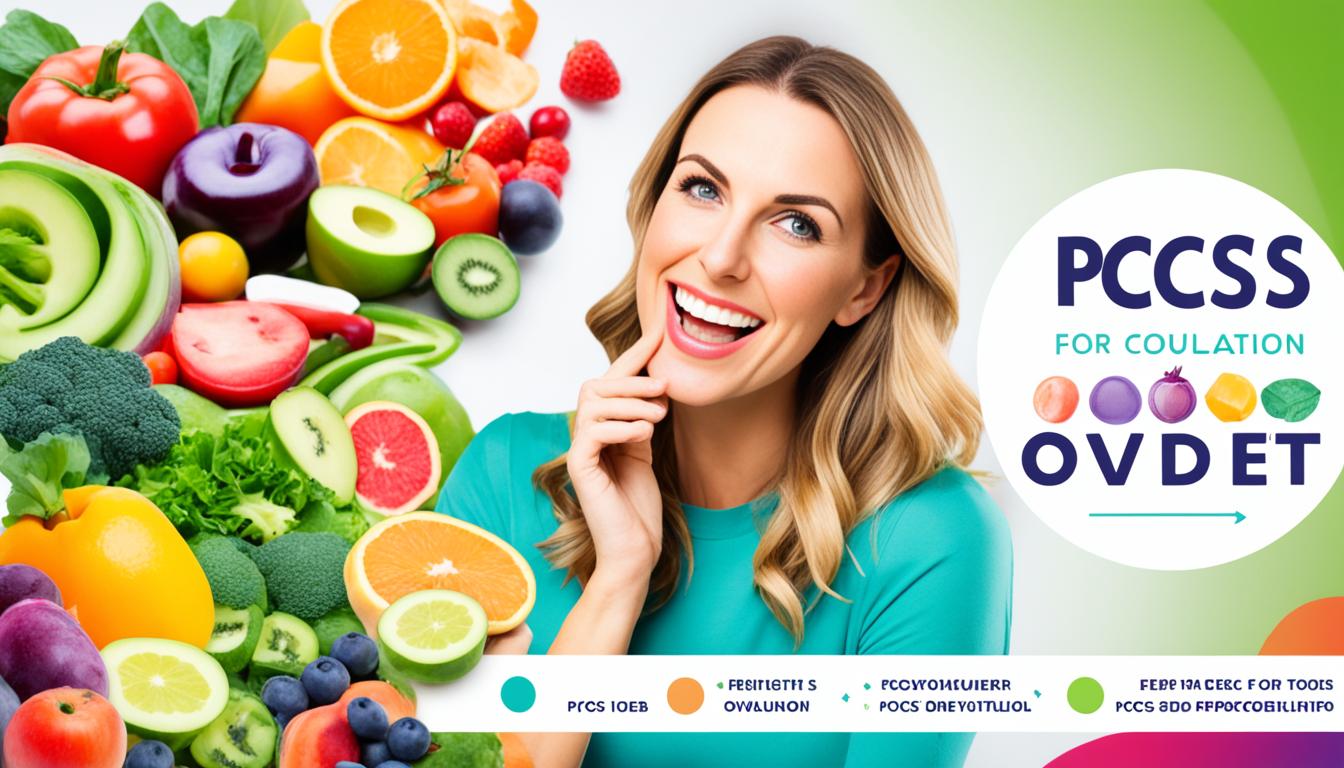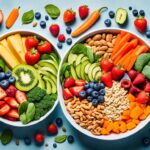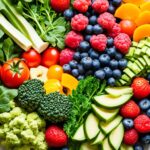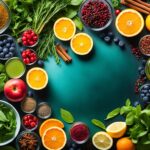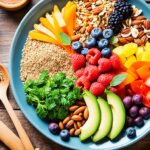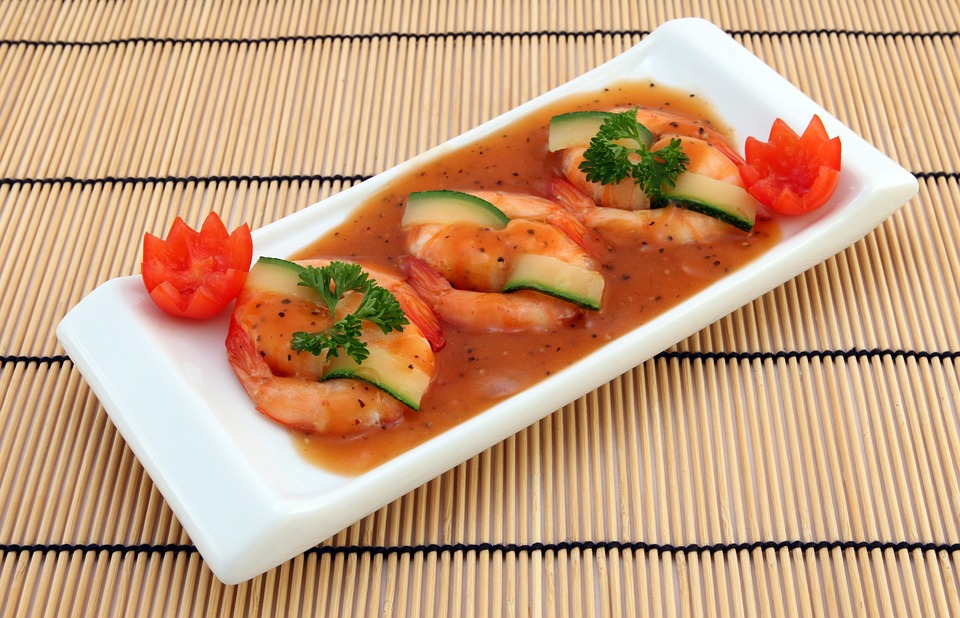Dear reader,
Struggling with PCOS and its effect on having a baby can be very tough. I’ve been through this too, and the desire for a child mixed with the emotional ups and downs is all too familiar.
But, there’s hope. Studies show that a proper diet can boost fertility in women with PCOS. By changing what you eat, you can make ovulation better and up your chances of getting pregnant without help.
When I found out I had PCOS, I didn’t know what to do. I felt lost. But, I found the right information and help, and got back in the driver’s seat of my fertility journey. Now, I’m here to pass that knowledge on to you.
In this article, let’s look into the best diet for PCOS to help you ovulate, listing what to eat and what to skip. I’ll even offer a meal plan and other helpful tips. Together, let’s get the information we need and control our fertility.
Key Takeaways:
- The right diet can improve ovulation and boost fertility outcomes for women with PCOS.
- Adopting a healthy and well-balanced diet is crucial for managing PCOS and optimizing fertility.
- By incorporating fertility-boosting foods and avoiding certain foods, you can support ovulation and hormonal balance.
- Weight management and other lifestyle factors play a significant role in PCOS and ovulation.
- Seeking professional guidance from a PCOS nutritionist or dietitian can enhance the effectiveness of a PCOS diet for ovulation.
Understanding PCOS and Its Impact on Fertility
About 1 in 10 women of reproductive age face PCOS. This disorder can really affect the chance of having a baby. Knowing its symptoms and effects is key to dealing with it and boosting chances of getting pregnant.
Irregular periods are a common problem with PCOS. This makes it hard to guess when ovulation happens. Hormonal imbalances caused by PCOS can mess with ovulation. Sometimes, ovulation doesn’t happen at all. For those wanting a baby, this can be tough.
PCOS brings more than just irregular periods. It can also lead to gaining weight, finding it hard to lose weight, more hair than usual, acne, and insulin resistance. Insulin resistance means the body doesn’t use insulin well, causing high blood insulin levels. This too can throw off hormone balance and affect ovulation.
For women with PCOS, understanding its effect on fertility is crucial. Taking smart steps to deal with it is a must. Getting advice from a reproductive health expert, like a fertility specialist or OB/GYN, is a good move. They can offer the right support to help get pregnant.
PCOS Symptoms
- Irregular menstrual cycles
- Difficulty getting pregnant
- Weight gain
- Excessive hair growth
- Acne
- Insulin resistance
To fight PCOS’s symptoms and challenges, women can act. Learning about diet and fertility in PCOS is important. The next section will show how changes in diet can help fix ovulation and periods.
The Link Between Diet and Fertility in PCOS
It’s well known that what a woman eats affects her fertility, especially if she has PCOS. Studies show changing your diet can help you get pregnant, have more regular periods, ovulate better, and lower the risk of miscarriage. Knowing how diet and fertility are connected is key to boosting your chances of having a baby if you have PCOS.
Eating healthy and balanced meals is vital for women with PCOS who want to get pregnant. The right nutrients can help bring your hormones into balance and keep your reproductive system healthy. A good diet can make your body’s natural processes work better, helping you ovulate more and increasing your odds of getting pregnant.
One big way diet affects women with PCOS is by tackling metabolic problems that can make it hard to get pregnant. Eating lots of nutrient-rich foods and cutting back on processed and junk foods can help. This kind of diet can keep your insulin levels in check, dial down inflammation, and balance your hormones.

Recent studies highlight how certain diets can really help women with PCOS have better chances of getting pregnant. A diet that focuses on low-glycemic foods can make your body more responsive to insulin and help you ovulate more regularly, increasing your odds of getting pregnant. Plus, adding plenty of good fats, like omega-3s, can help your reproductive system and hormone levels, too.
Remember, the best diet for improving fertility in women with PCOS is the one that’s right for you. Getting advice from experts in PCOS nutrition can be a big help. They can create a diet plan that’s not only healthy but also fits your lifestyle and tastes.
In summary, diet can be a powerful ally for women with PCOS who want to get pregnant. By eating right, fixing metabolic issues, and consulting with the right professionals, you can take steps to make your baby dreams come true.
Key Nutrients for Supporting Ovulation in PCOS
Certain nutrients are key for women with PCOS to have healthy ovulation. Eating foods that are packed with these nutrients can help boost ovulation and increase fertility chances. Let’s look at some important nutrients to add to your diet:
1. Protein
Protein is crucial for ovulation in PCOS. It keeps your blood sugar levels in check and helps your hormones stay balanced. Choose lean proteins like chicken, turkey, fish, tofu, and beans for your meals.
2. Omega-3 Fatty Acids
Omega-3 fatty acids can make ovulation better and lower inflammation in PCOS. Get them from fish like salmon, mackerel, and sardines, or use a good fish oil supplement.
3. Antioxidants
Antioxidants are great for protecting eggs and follicles from harm, which can boost ovulation in PCOS. Eat plenty of colorful fruits and veggies, including berries, spinach, kale, and bell peppers. These foods are full of antioxidants and other good things.
4. Essential Vitamins and Minerals
Vitamins and minerals are essential for ovulation and reproductive health in general. Make sure you’re getting enough vitamin D, B12, iron, zinc, and magnesium. Do this by eating foods like eggs, dairy, meats, nuts, seeds, and greens.
Adding these nutrient-rich foods to your meals can help keep ovulation healthy and improve your chance of getting pregnant. Always talk to a doctor before you change your diet or add new supplements.
Foods to Include in a PCOS Diet for Ovulation
Including certain foods in your diet can really improve how well you ovulate. This is key for women battling PCOS. Nutrient-rich foods, full of essential vitamins, minerals, and antioxidants, support healthy ovulation.
Legumes, like beans and lentils, are packed with plant-based protein and fiber. They help keep blood sugar in check and balance hormones. This makes them great for those with PCOS.
Healthy seafood, like salmon and sardines, is rich in omega-3 fatty acids. It fights inflammation and boosts hormonal health. Adding these to your diet helps support ovulation and fertility.
Go for lean meats, such as chicken and turkey. They’re full of high-quality protein, which is crucial for hormone production. This aids in regulating ovulation.
Swap out bad fats for olive oil, which is good for your heart. It’s full of monounsaturated fats that cut inflammation and help balance hormones in PCOS.
Eating a mix of vegetables means getting key nutrients, fiber, and antioxidants. Veggies like leafy greens and broccoli are top choices for boosting ovulation.
Enjoy whole fruits, such as berries and apples, for a vitamin and antioxidant boost. They’re good for your health and help with fertility.
Choosing whole grains is smart. Foods like quinoa, brown rice, and oats are full of fiber and vitamins. They keep blood sugar stable and help with hormonal balance.
Add these nutrient-packed foods to your diet for better ovulation and fertility. Always chat with a healthcare pro or a nutritionist to get tailored meal tips and advice.

Wanna dig deeper into why a diet can up your ovulation game with PCOS? This study by experts tells more.
Foods to Avoid for PCOS and Ovulation
To better your chance of ovulation and getting pregnant with PCOS, steer clear of certain foods. These foods can worsen your symptoms and stop ovulation. Here’s what to avoid:
- Processed and refined foods: Such foods are full of added sugars, bad fats, and fake extras. They make inflammation and hormonal troubles worse.
- High glycemic index carbohydrates: Think white bread, pasta, and sweet snacks. They hike your blood sugar fast, making your body release more insulin. This up-and-down can mess with your ovulation.
- Trans fats: You get these from many fried and processed foods. They bump inflammation and mess up hormone making.
- Excessive caffeine: A bit of caffeine is okay, but too much can upset your hormones and ovulation. Keep your caffeine intake in check.
- Alcohol: Too much alcohol can throw off your hormone balance and stop ovulation. It’s wise to cut back or not drink at all.
- High mercury seafood: Seafood like shark, swordfish, and king mackerel can be high in mercury. Mercury is bad for fertility, so steer clear of those types.
Staying away from these foods cuts down on inflammation, helps keep your hormones in check, and boosts your chances of ovulating and getting pregnant.

The Role of Weight Management in PCOS and Ovulation
Weight management is key for women with PCOS and for better ovulation. Many gain weight with PCOS, which worsens symptoms. This can cause insulin resistance and disrupt hormone balance, making ovulation irregular.
Eating well and being active are crucial for weight and insulin control. A healthy diet and regular exercise support weight loss and foster ovulation. This increases pregnancy chances for PCOS women.
For diet, focus on foods rich in vitamins, minerals, and antioxidants. These include fruits, veggies, whole grains, lean proteins, and healthy fats. They aid in weight management and boost health.
Exercise is also vital for weight and ovulation management. Cardio, strength training, and yoga help in various ways. This includes burning calories, building muscle, and improving insulin function.

Start slow with exercises to avoid harm. A health pro or fitness expert can create a plan for you. This will be safe and help you meet your goals.
Managing your weight through diet and exercise is powerful for PCOS. It balances hormones, increases insulin function, and boosts ovulation and pregnancy chances.
Additional Lifestyle Factors to Support PCOS and Ovulation
A balanced diet is key for PCOS and better ovulation. But, it’s not the only thing that helps. Find ways to lower stress, get enough sleep, and exercise. These steps boost the power of your PCOS diet on ovulation.
1. Stress Management and PCOS
Stress can mess up your hormones and ovulation. Finding ways to chill is very important. Try yoga, meditation, or hobbies that calm you. Taking care of yourself and relaxing can help you ovulate and feel better.
2. Sleep and PCOS
Getting enough sleep is crucial for your health. It keeps your hormones in check and helps with ovulation. Aim to sleep 7-9 hours each night for the best results. Make a bedtime routine and a cozy sleep space. If you still have trouble sleeping, talk to a doctor for help.
3. Exercise for Ovulation in PCOS
Working out keeps you at a healthy weight and helps you ovulate. It makes you more sensitive to insulin, balances hormones, and cuts stress. Shoot for 150 minutes of exercise a week. This can be walking, swimming, biking, or joining a gym class. Your doctor can help pick the best exercises for you.
Reducing stress, sleeping well, and working out can make a big difference. They help with PCOS and up your chances of ovulating. Remember, combining a healthy diet with these steps is a great plan for ovulation.

The Role of Supplement in PCOS and Ovulation
Certain supplements are great for making ovulation and fertility better in PCOS women. Omega-3 fatty acids, inositol, and vitamin D do well to help ovulation and keep hormones in check. They boost the chance of getting pregnant by supporting reproductive health.
Omega-3 fatty acids do solid work in improving fertility. You find them in food like salmon and mackerel. They make sure periods are regular and help the ovaries work better. Plus, they calm down the body’s response that causes PCOS symptoms.
Inositol is a B vitamin that’s strong against PCOS symptoms. It improves how the ovaries work. Found in citrus fruits, beans, and nuts, it’s also a supplement option.
Many women with PCOS are low on vitamin D, which hurts their fertility. Getting enough helps with making babies. You can find it in the sun, fish, dairy, and egg yolks. But, talking to a doctor about supplements is smart.
The Best Supplements for PCOS and Ovulation:
- Omega-3 fatty acids
- Inositol
- Vitamin D
Always talking to a doctor before trying new supplements is key. They will make sure it’s right for you and your health. They can check for any problems with other medicines, and suggest what’s best for you.

Seeking Professional Guidance for PCOS and Ovulation
If you find PCOS a challenge and want to better your chances of ovulating, experts can help. A knowledgeable PCOS nutritionist or dietitian offers advice that fits your personal needs.
Working with these experts means understanding what your body needs. They tailor a diet plan just for you. This plan considers your likes, health goals, and what your body needs.
Experts in PCOS nutrition help you choose the right foods. They tell you what to eat and what not to eat, helping ovulation. This can make a big difference in your fertility.
A PCOS dietitian can also give you meal plans. These are made to boost your chances of ovulating and getting pregnant. The plans focus on the right balance of nutrients in foods you like.
Getting professional help means you won’t be alone. These experts will support you at every step, making sure your diet plan works for you. They’ll help with any changes you need to make, too.
The Benefits of Working with a PCOS Nutritionist or Dietitian
- Personalized advice: They’ll adjust their tips to fit your individual needs and health goals.
- Meal plans: Get meal plans made just for you, to help with ovulation and fertility.
- Guidance on food choices: They can steer you towards foods that are good for you and away from those that aren’t.
- Support and accountability: They’ll keep you on track and motivated with their support.
- Expertise in PCOS nutrition: These experts know a lot about eating right with PCOS.
When looking for help with PCOS, it’s key to find the right expert. Choose someone who really knows about PCOS. They can help create a diet that boosts your chances of getting pregnant.

Conclusion
A healthy diet is key for women with PCOS looking to improve ovulation and fertility. By choosing the right foods and avoiding unhealthy ones, managing weight, and taking care of other lifestyle habits, they can increase their odds of getting pregnant.
Research shows that what we eat really matters for PCOS and fertility. Making smart choices in our diet can boost chances of getting pregnant, help with ovulation, keep menstrual cycles regular, and lower the risk of miscarriage.
For personalized advice and support, it’s wise to see a PCOS nutritionist or dietitian. They can create meal plans that fit specific needs, making diet changes easier and more effective. With their help, women with PCOS can better plan their diet to improve the chances of having a baby.

